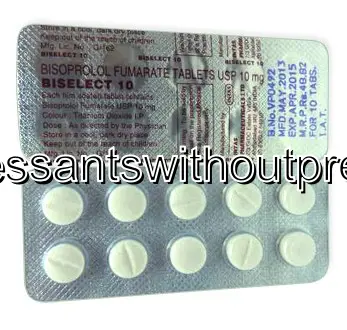| Package | Dosage | Price | Price per Dose | |
|---|---|---|---|---|
| Dosage: 5mg | ||||
| 360 pill | 5mg | NZD565.65 | NZD1.57 | |
| 180 pill | 5mg | NZD311.23 | NZD1.73 | |
| 120 pill | 5mg | NZD230.03 | NZD1.92 | |
| 90 pill | 5mg | NZD189.44 | NZD2.11 | |
| 60 pill | 5mg | NZD140.72 | NZD2.35 | |
| 30 pill | 5mg | NZD83.88 | NZD2.81 | |
| Dosage: 10mg | ||||
| 180 pill | 10mg | NZD278.75 | NZD1.54 | |
| 120 pill | 10mg | NZD205.67 | NZD1.71 | |
| 90 pill | 10mg | NZD165.08 | NZD1.84 | |
| 60 pill | 10mg | NZD124.48 | NZD2.06 | |
| 30 pill | 10mg | NZD73.05 | NZD2.41 | |

Bisoprolol Description
Overview of Bisoprolol
Bisoprolol is a medication commonly used in the treatment of cardiovascular conditions. It belongs to a class of drugs known as beta-blockers. These medications work by blocking the effects of adrenaline on the beta-adrenergic receptors in the heart and blood vessels. The result is a decrease in heart rate, blood pressure, and strain on the heart. Bisoprolol is often prescribed for managing hypertension, angina, and certain types of heart failure. Its ability to improve heart function and reduce the risk of cardiovascular events makes it a vital part of many treatment plans.
How Does Bisoprolol Work?
The primary action of bisoprolol involves selective blockade of beta-1 receptors in the heart. By targeting these receptors, bisoprolol decreases the heart's workload and oxygen demand. This leads to a lowering of blood pressure and alleviation of anginal symptoms. Because it is selective, bisoprolol tends to cause fewer side effects related to the lungs, such as bronchospasm, compared to non-selective beta-blockers. Its long half-life allows for once-daily dosing, providing convenience for patients while maintaining steady therapeutic levels.
Benefits of Using Bisoprolol
Patients taking bisoprolol often experience significant benefits. It effectively reduces high blood pressure, helping to prevent strokes, heart attacks, and kidney problems. For those with angina, bisoprolol can decrease the frequency and severity of chest pain by reducing myocardial oxygen consumption. In cases of chronic heart failure, it can improve symptoms and overall heart function when used alongside other medications and under a doctor's supervision. The medication's ability to stabilize heart rhythm makes it useful in certain arrhythmias as well.
Possible Side Effects and Precautions
Like all medications, bisoprolol can cause side effects. Some common ones include fatigue, dizziness, cold hands or feet, and gastrointestinal disturbances. Because it lowers heart rate, there may be instances of bradycardia, which requires medical attention. Patients with respiratory issues such as asthma should use bisoprolol cautiously, even though it is selective. It is important to inform the healthcare provider about any existing health conditions, especially severe conduction abnormalities or heart block. Gradual dosage adjustments and regular monitoring are key to minimizing risks.
Usage and Dosage
Bisoprolol is typically taken once daily, with or without food. The prescribed dose varies depending on the condition being treated, the patient's response, and medical history. It’s crucial to follow the doctor's instructions precisely. Sudden discontinuation of bisoprolol can lead to worsening symptoms or cardiac events, so the medication should be tapered off under medical supervision. Regular check-ups and blood pressure monitoring are recommended to ensure optimal treatment outcomes.
Conclusion
Bisoprolol remains a widely used beta-blocker with proven efficacy in treating various heart-related conditions. Its selective action and long-lasting effect make it a convenient option for many patients. While generally well-tolerated, it carries some risks that necessitate proper medical guidance. When used correctly, bisoprolol can significantly improve quality of life and help prevent serious cardiovascular complications. Patients should always consult with a healthcare professional before starting or stopping this medication to ensure safe and effective treatment.
